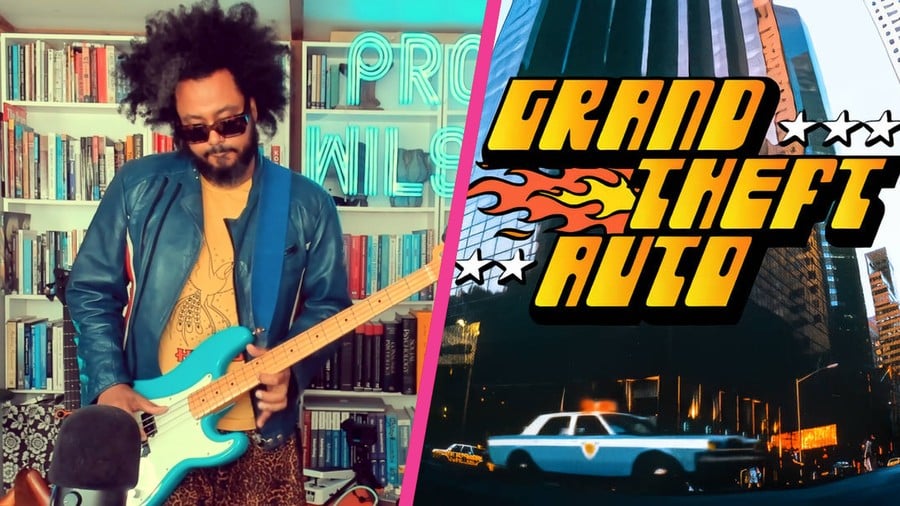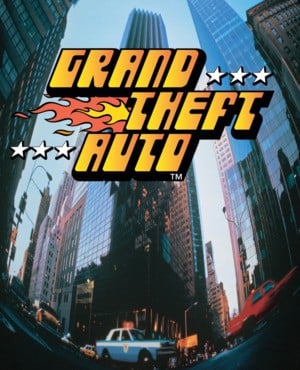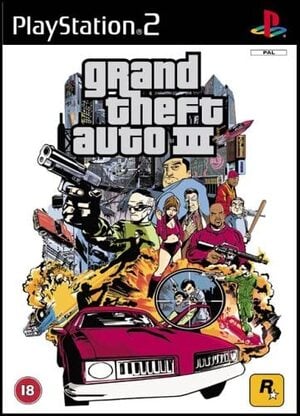
As part of our end-of-year celebrations, we're digging into the archives to pick out some of the best Time Extension content from the past year. You can check out our other republished content here. Enjoy!
The history ofGrand Theft Auto has been covered on many occasions, but there’s one person who rarely gets to tell their part in its story: Jonathan Wilson, better known as his rap alias Robert De Negro.
The university professor is responsible for rapping on Grand Theft Auto's original theme song 'Joyride', and wrote several of the other tracks. He also provided voices for the police in the game and delivered the iconic "BUSTED!" that plays whenever the cops put an end to your crime spree. It's hard to imagine the first few Grand Theft Auto titles without his contributions, but because he hid behind an alias, and there are now so many social media accounts where people adopted his name, there are some who still believe that he is a fictional character rather than a real human being. Recently, we were able to catch up with Wilson and set the record straight. He told us more about his rap career prior to Grand Theft Auto, his experiences meeting and recording with DMA musician Craig Conner, and what he's up to now. So strap in, and let's go for a joyride!
The 0161 Thing
Wilson was born in Manchester to a Scottish dad and a Caribbean mum. As a teenager, he grew up around Whalley Range, Moss Side, and Old Trafford, which is where he first developed his love of alternative rock, grunge, indie, hip hop, and jungle. Though the Madchester scene was in full swing at the time, Wilson says "black and Asian musicians weren’t really getting a look in", so he instead became involved with the underground hip hop and jungle scene, which was also generating some underground buzz.
In 1992, Wilson left the city to attend university up in Dundee. He joined a rock band playing bass guitar, while also studying and working as a sound engineer in Dundee's various music venues. A highlight was when the band supported Gun, famous for their cover single ‘Word Up’. When the band split, together with his little brother Ewan, a.k.a Goose the Chimera and "the hottest emcee" on the Manchester scene Eric-T, he formed a small rap group called Skillaz and created the alias "Robert De Negro" as a homage to the American actor Robert De Niro. Skillaz performed several shows around Dundee and Manchester. Then in 1996, they won a competition to find Dundee’s best dance music act, and went onto represent them in the Scottish final, only to lose out to some rave outfit "with straight beats, neon, and dancers". Wilson said, “What can I say, Scotland loves its umph umph umph beats and plinky piano music”
He goes on to tell Time Extension. "The music scene was pretty straightforward in Dundee. It pretty much revolved around one main music shop. There was the band scene, the DJ scene, and the sound engineers, and I was involved in all three of them [so] I was known in the music scene. It sounds really pompous, right? But you got to think that Dundee is a small city in Scotland and you could count on one hand how many black people lived in Dundee, so I stuck out like a sore thumb."
It was while the rapper was performing around Dundee that he met Craig Conner, a musician at DMA Design who he describes as speaking in "a strong Aberdonian accent". Today, he can't remember the exact specifics surrounding their meeting, but he seems to recall that Conner rang him up, before showing up at his flat and asking him to help record a track for a video game he was working on. Of course, as we now know, that game was 1997's Grand Theft Auto.

During the development of Grand Theft Auto, the audio team inside DMA Design conceived the idea of having different radio stations in the game, which meant having different genres for each channel. Unable to license artists with the audio budget they had at their disposal, Conner, audio manager Colin Anderson, and the other musicians did everything themselves but knew they needed to go outside DMA for the rap station NCT-FM. This meant finding local talent. And fortunately for them, Wilson was up for the challenge, though not as cheap as they originally expected.
"The hourly rate they offered me was pitiful," laughs Wilson. "I managed to negotiate it up a bit to something that I thought was better. Still, though, I would say that they got me cheap. It was after that when I became aware of the fact that this was a small company and they had some big aspirations. I remember them saying, ‘We want to do something that no one else has really done before."
At the time, Wilson wasn't much of a gamer. In the mid to late 80s, he, like so many other kids, had become hooked on the ZX Spectrum and games like Daley Thompson's Decathlon. He'd also heard of Lemmings and DMA. But that was about the extent of his gaming knowledge. He didn't know much about the game-development process at the time and so was cautious about how his involvement might impact his future prospects.
Da Shootaz
As he tells Time Extension, he asked to sign the contract under his rap alias and requested that he be credited under the name Robert De Negro, rather than Jonathan Wilson. This was a way of keeping the two worlds separate, still hedging his bets in wanting to pursue a career linked to his university studies in science and business. That way he could just deny being Robert De Negro if it ever came up.
Wilson enjoyed the experience of writing and recording with DMA's musicians. He threw himself into the work, spending a ton of time in the recording studio, which he now describes as "a makeshift booth in a large open-plan office" with some duvets and dividers up for soundproofing. Together with Conner, he mostly worked in the evenings, which was when the office was quieter and when they could start recording the vocals for several of the game's fictional acts like Da Shootaz, Slumpussy, and CCC. How it worked initially was that Conner would come up with the beats and some skeleton lyrics for the title track, and then Wilson could jump in, tweak things, and add his opinion where he saw fit.
"Craig is such a humble guy and such a cool guy," says Wilson. "He gave me so much latitude in basically saying like ‘You’re the hip hop guy’ or ‘You’re the guy with credibility’ and stuff like that. So if I thought that something sounded crap, he would be like ‘We won’t do it.' So he would run stuff by me and I would be like ‘Yeah, yeah, yeah, I like it,' or ‘That beat is good,' so we worked in that way."
For Grand Theft Auto's main theme, 'Joyride', by the fictional group Da Shootaz, Conner had already written out the lyrics for Wilson, but the rapper again contributed some of his own ideas to the track. Conner, for instance, had described the direction for the theme as booming and bassy, and so to go along with this, the vocalist altered his cadence to emulate one of his heroes Chuck D from Public Enemy.
As for the other songs, Wilson had a ton of freedom to experiment with new vocal styles and lyrical content, which you can see when you compare the laidback approach of something like Slumpussy's 'This Life' to the hard-edged hip hop of CCC's 'Blow Your Console'. This style of collaboration continued for the game's 1999 sequel Grand Theft Auto 2, where Wilson again contributed some hip-hop tracks, including 'E=MC Feelgood Carjacking In Hilltown' and 'Showin Me Love'.
"The brief was always, ‘We want to think gangsta’, but at the time we were also thinking about what Craig and the guys, and what Colin thought was cool," recalls Wilson. "And if I think about their vibe it was like Tarantino movies like Pulp Fiction and Reservoir Dogs. And it was like Fun Lovin’ Criminals, the band. And all that stuff. Like I remember people always vibing about that. It was like, ‘We want to put that in a game.’
"I like [E=MC Feelgood from GTA 2 specifically] because I wrote the lyrics and mentioned different places in Dundee," he adds. "So Hilltown is in an area in Dundee. Charlestown. Whitfield. And Trottick. So that was like a name drop; wouldn’t it be cool that we celebrate that this game was made in Dundee? And I thought the best way was just to mention all of those little districts from Dundee. And no one else would know. But if you’re from Dundee, ‘You’re like Yes!’ But to everyone else, they're just a bunch of place names. I thought that was quite a hip-hop thing to do because I’m listening to like Wu-Tang talking about Staten Island or you know Brooklyn or Queens. So that was my thinking."
Busted
With Wilson spending so much time with Conner at DMA Design, he soon found his involvement on the game growing beyond music. He helped out with the sound effects in Grand Theft Auto 1, for instance, providing the voice of the police officers when you're running around on foot, and also contributing the booming voice sample, "BUSTED", that plays whenever you're apprehended.
He recalls, "I remember having a list of things that I would have to say and they would obviously appear in the game. So you had these soundbites where it would be like a radio call where it was like, ‘We got a 6-15 on east Hackenslash *imitates radio static*.’ I’m sure I was imitating the radio noise at times. Or I had to make it sound like a radio. It seems weird now because there’s probably an effect or filter where you can do that. I had to do all of those and read them out."

Sadly, Wilson didn't contribute much to Grand Theft Auto III, the third game released in 2001. Though it is possible to hear 'Joyride' on Lips106, as a nod to the series's roots. He also later provided some beatbox skits to Grand Theft Auto: Vice City, but that would end up being it. Instead, Wilson went his separate ways, dropping the name Robert De Negro and joining a band named Charged, with which he played at Glastonbury in the early 2000s, on BBC TV, and a bunch of other festivals in Europe. Now he's a university professor with a DLitt (Doctor of Letters) and Ph.D. (Doctor of Philosophy) from two separate universities and spends his time split between lecturing, consulting, and speaking internationally on branding. Wilson says “I found another path to being a rockstar performer and writer as an academic. I’m currently in the Netherlands filming a branding course with my own dressing room, team, and yes a bass guitar”.
Grand Theft Auto fans, in the meantime, have often speculated online about the identity of Robert De Negro, but there's a surprising amount of misinformation out there, with even the GTA Wiki showing a picture of a random person. As a result, Wilson often finds himself having to jump in and correct people on occasion.
"I remember recently with the 25-year anniversary Colin [Anderson] was interviewed for a podcast and he mentioned my name and they cut it out because they thought it would be culturally insensitive," says Wilson. "I got tagged in the tweet. It was like a few months ago, and I actually went on Twitter and kind of said something like, ‘I am Robert De Negro, and I can confirm that it is not offensive to use my name, I encourage people to do so, and I am not some spotty, skinny, white, computer geek, I am a real black person.’"
Grand Theft Auto has clearly continued to have music in its games in the years since, with Rockstar even partnering with popular acts like Dr. Dre and Flying Lotus. But all of this wouldn't have been possible, if not for the foundations that the Scottish audio team, and musicians like Wilson, laid down on those original titles. Despite composing wholly original tracks, they showed the concept of radio stations could work and gave the game an authenticity that breathed life into Liberty City and Anywhere City. Now it's time to step forward and get his flowers.
What are your favourite memories of the first two Grand Theft Auto games? Comment and let us know!






Comments 2
Brilliant article, guy sounds like a legend!
Lovely article! In fact, I've been meaning to get around to reading this for a good while now. I do want to mention a few things in regards to the song respective names. 'Joyride' is nickname often given to the iconic song that is actually called 'Grand Theft Auto' & 'Carjacking In Hilltown' is just 'Jacking In Hilltown'.
Show Comments
Leave A Comment
Hold on there, you need to login to post a comment...